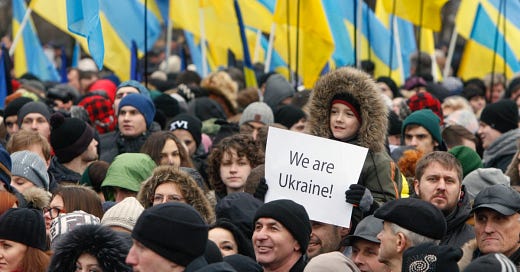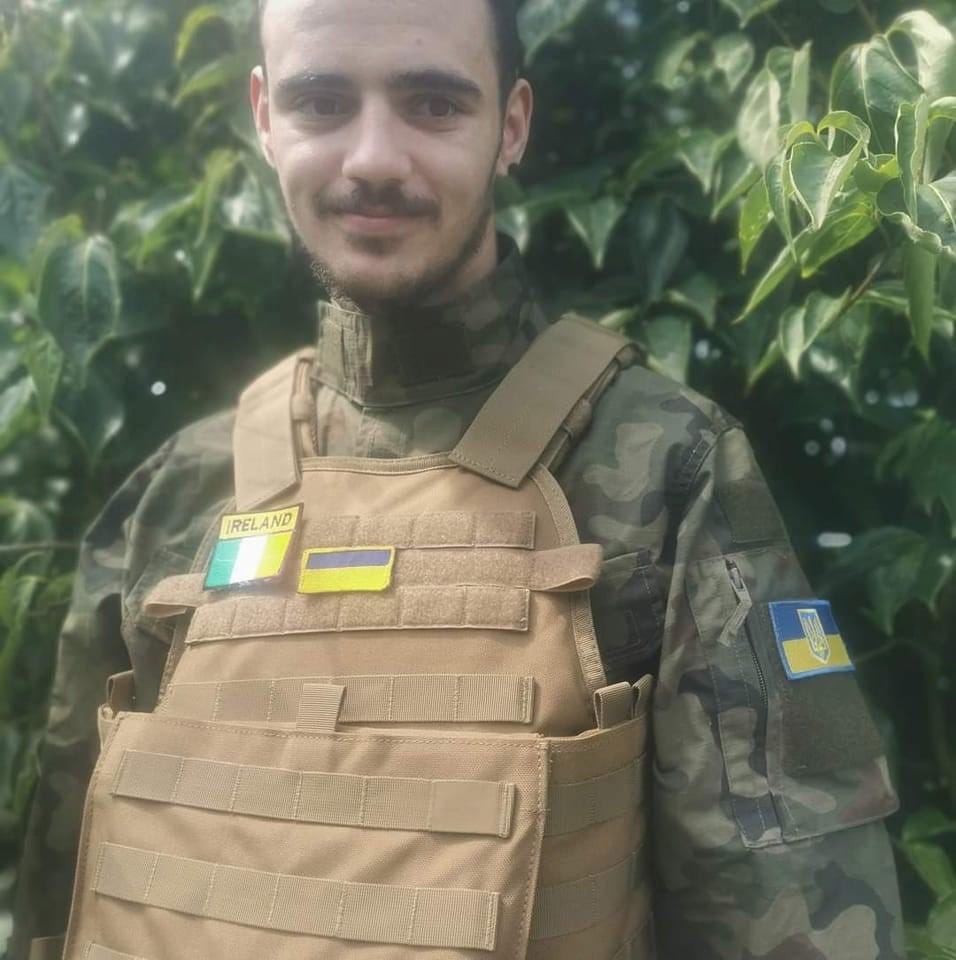I met Jouseph while working on Ukrainian refugee relief in Poland last year. A good-size segment of the volunteer corps working from the main facility in Przemyśl were folks who had taken up the call to defend Ukraine in the days and weeks after the invasion and were now waiting to be accepted into a unit or militia across the border. Ukrainian fighting groups were heavily oversubscribed, so many would-be combatants, including even Ukrainian ex-pats, were stuck in Poland for weeks, even months. Jouseph was one of these. He came from Ireland. I really doubted he was going to get drafted on. There were volunteers at the refugee facility who had military service backgrounds, who could speak tactics and organization, who seemed hard and ready. Jouseph was pale, wiry, hesitant, even meek. If we had had a fist-fight, I’m pretty sure I’d have taken him down with a punch. And I ain’t much.
You make a lot of friends and you hear a lot of stories working in refugee relief. You also meet folks you can’t imagine knowing or befriending in “civilian” life. Despite his diffident demeanor, Jouseph was preternaturally talkative (as in logorrheic). I oversaw sleeping accommodations for as many as 500 refugees each night. It was important to move quickly, stay alert and be as silent as possible until morning. Often, Jouseph would pull up a chair, just off my shoulder and behind, and just speak. About anything, really. He talked a lot about Ireland, and in particular how much the Irish truly despise the English. I’m a big admirer of the Irish poet-mystic William Butler Yeats, so the background and history is I guess familiar enough. From “Easter 1916,” which memorializes the Easter Rising against the English:
Too long a sacrifice
Can make a stone of the heart.
O when may it suffice?
That is Heaven's part, our part
To murmur name upon name,
As a mother names her child
When sleep at last has come
On limbs that had run wild.
What is it but nightfall?
No, no, not night but death;
Was it needless death after all?
For England may keep faith
For all that is done and said.
We know their dream; enough
To know they dreamed and are dead;
And what if excess of love
Bewildered them till they died?
I write it out in a verse—
MacDonagh and MacBride
And Connolly and Pearse
Now and in time to be,
Wherever green is worn,
Are changed, changed utterly:
A terrible beauty is born.
Jouseph was steeped in the convention of Yeats, but not the language. I wished he was more articulate, or more interesting, or could at least clarify what drove him to try to enlist. We talked across many hours. He constantly scrolled his phone for videos to show me. Sometimes it was silly stuff, music videos. Mostly it was video from the front lines, taken by soldiers in battle or waiting to be. Jouseph wanted simply to be military, I felt. He wanted to be military, and to fight, because that is what men do when some are being attacked. I sensed in his manner that he knew powerlessness, that his unsureness came from not confidently knowing how others might react to him, and that experience told him not to hope for too much. But he also knew where none of that mattered, where it could all be redeemed, and that was on the battlefield.
He had a frenemy, Owen, an exasperating Canadian around the same age, and they competed for the affections of a refugee girl from Kharkiv who also served as a volunteer. I did not like this, and I made it very clear. But these were young adults, and she was very much willing. Owen, comparatively suave, had the upper hand, and seemed to be trying to reenact “The Marriage of Maria Braun” on fast-forward, but a groundhog-day version where he is always headed off to war and never goes, so it’s forever a frozen moment of passion at the eve of departure. For a week, the girl would cry and Owen would make promises: when he comes back, he’ll find her.
You could tell: There was so much longing in Jouseph. To have a girl who would wait for him. One who would be upset when he goes, one who he could imagine being safe somewhere while he fought, knowing he was fighting for her. Jouseph did not have the words for this, but he had the sulk. He was becoming miserable and distracting. I assigned him tasks, just to keep him busy and focused. It was no use. One night, Dave, a gloriously vulgar Irishman, equal parts den mother, superintendent and spiritual conscience, pulled Jouseph aside and read him the riot act. Dave asked me to join so that Jouseph would understand this was serious. There were refugees — the girl was a refugee — and Dave wasn’t going to tolerate some mopey Irish bloke getting hung up on his stupid feelings and failing to serve the cause. If Jouseph didn’t shape up, Dave promised to take him out. For the honor of Ireland.
Jouseph took this all in, and nodded. And I suspected, in that moment, that Dave was probably the only real father Jouseph had ever known. Suddenly I wished Jouseph would never cross that border to fight.
***
I’m pretty sure there’s nothing more noble than fighting for strangers. There are examples of moral courage that compare — Churchill’s steadfastness amid the growing German threat, and in the face of near-universal mockery and disparagement, comes to mind. And there is physical courage and sacrifice — “uncommon valor” — when death seems all but assured, that occupy a category of nobility all their own. There’s live organ donation. But to give maybe everything to defend persons unfamiliar or unknown, when the stark reality is that their deaths would be felt nowhere around you? We’re equipped as a specie to ignore strangers, even disdain them. And I think there is genuinely a question about whether we are really avoiding strangers for our own safety or in fact creating them to relieve the burdens that come with acknowledgment. Strangers are always someone else’s responsibility, and possibly just their own.
Us Jews, we are the strangers of world history — separate, mysterious, esoteric. It has made us very easy to kill. In fact, historically, we have often faced resistance to attempts to blend in with the rest. Many populations seem to like to keep us as strangers, possibly so a scapegoat can be readily identified when one is needed (and one always is). Years ago, after a workout, I stood in the member lounge of my gym, watching a grim television report from the war in Iraq. A woman stood beside me. She was probably in her late fifties at the time, and from her accent and complexion I could guess she from somewhere in South Asia originally. “It’s all because of the Jews,” she said, nodding at the TV. I paused for a moment. “I happen to be Jewish, and….” She stopped me short. “The Jews are terrible, awful people,” she said, and walked away. Yup, better off strangers. No counting on her at the next pogrom.
In war, strangers are the people you fight against. As you look at the history of civil wars, even our own, what stands out in the lead-up is often the process of estrangement, as people who may even have been familiar or knowable at one time are made exotic and unreliable and then irredeemable. The Balkan conflict of the 1990s was particularly notable for this. Combatants lived in the same same villages, or even next door, to those they would kill, with nothing to distinguish them but perceived ethnic difference. There are shades of this in modern internet political culture — hatred as an extension of contrived unfamiliarity — which is why there are people now who mutter darkly about the inevitability (or maybe the desirability) of another civil war. It seems impossible. But there were once Bosnians living next to Serbs living next to Croats.
Vladimir Putin likes to refer to Ukraine as “Little Russia,” as if to suggest familiarity and also fraternity. But the Ukrainians are strangers to him, which is why he feels so comfortable murdering them. You have to see strangeness in the face of enemies to be able to blow up their schools, their hospitals, their electric-supply stations and water-treatment plants. You have to feel there are grounds for indiscriminate, actually genocidal, violence. And those grounds are not that they flirted with E.U. membership or hoped for the protection of NATO. Even if you gave it 500 years, Ukraine would never have sent a single soldier across the Russian border with a mission to destroy. Putin wants them dead for the sheer dying of it.
The Ukrainians are not strangers to those who would try to take responsibility for their safety. You really could say that much of the honor and nobility in taking up arms to defend them is in the implicit understanding that you would do for them what you would do for your own family or nation: that you will not make them strangers. You will not pass on responsibility.
Is it possible to be noble and also unwise? What I know is that ignoble persons are apt to dress up their indifference as wisdom. I think in particular of the Tucker Carlsons of this world who find in the most malign and brutal onslaught an opportunity to wonder whether we’re too soft on the victims and too willing to lie on their behalf. (There are very noble reasons to oppose war. Of the ignoble reasons, the very worst is that some people aren’t worth defending.) One of my personal heroes, Orwell, wrote a book, Homage to Catalonia, which is a record of unwisdom in service to a noble purpose. The book is about Orwell’s decision to join a Republican militia in the fight against the Fascists in the Spanish Civil War. Orwell had no military service to speak of, could not speak the language, and when he was honest with himself wondered whether the group he had joined — a motley, mutually distrustful assemblage of communists, socialists and anarchists — really was all that enlightened anyway. (He ended up being wounded in the fighting.)
In Homage Orwell writes, "I had come to Spain with some notion of writing newspaper articles, but I had joined the militia almost immediately, because at that time and in that atmosphere it seemed the only conceivable thing to do.” Sometimes, the good man knows only that he cannot do nothing at all.
Jouseph Guemboura, of Dublin, was reportedly killed in action Wednesday, in Ukraine. He was 21.





